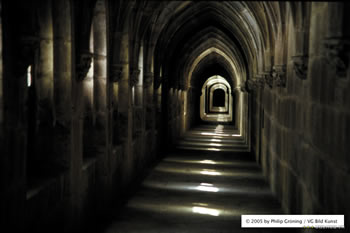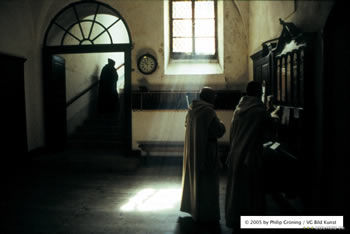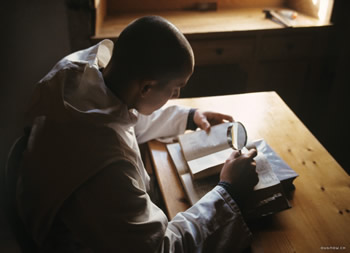"Quick to Listen, Slow to Speak"
Toxic Talk and The Virtue of Silence
For Sunday September 16, 2012
Lectionary Readings (Revised Common Lectionary, Year B)
Proverbs 1:20–33 or Isaiah 50:4–9
Psalm 19 or Wisdom of Solomon 7:26–8:1 or Psalm 116:1–9
James 3:1–12
Mark 8:27–38
Last month my wife began her seventeenth year teaching second grade, and so our dinner conversations have included stories about her new class — cute kids and smart kids, academic challenges and behavior problems, anxious parents and peanut allergies. One girl's story made me cringe. When Melanie wouldn't do her work, my wife asked why. She said, "my dad yelled at me last night 'cause I couldn't go to sleep." Melanie's mother is in jail. A self portrait she drew pictured an angry child with eyes squeezed tight and bared teeth.
It's a painful example of the power of speech to inflict personal harm.
 |
And what about our country's political speech? It's hard to imagine anything more vapid or more corrosive to civic life.
What we say often reveals our lack of wisdom, as when Rep. Todd Akin, who's running for the U.S. Senate, commented on abortion in the case of rape: "From what I understand from doctors, that's really rare. If it's a legitimate rape, the female body has ways to try to shut that whole thing down." What was he thinking? How can someone who is really smart say something so stupid?
We all have our own memories — words that wound or heal, given and received.
The epistle of James includes the longest passage in the Bible about the role of speech in the life of a Christian. "We all stumble in many ways," says James; only the person who has "tamed the tongue" can claim Christian maturity. It's not easy. Humanity has tamed the world of nature, James observes, "but no one can tame the tongue."
Human speech seems innocent enough. After all, the tongue is such a small part of the body. But its small size belies its powerful influence; James compares it to a bit that controls a horse or a rudder that steers an enormous ship. The tongue can burn like a raging forest fire, he says, incinerating everything that it touches. It corrupts both the subject and object of speech. What we say to one another, James writes, can be "full of deadly poison" that kills.
What we say can reveal more about us than about the recipient of our speech. The scary part about toxic talk is that it reveals the character of our inner identity. "Out of the overflow of the heart," said Jesus, "the mouth speaks. The good man brings good things out of the good stored up in him, and the evil man brings evil things out of the evil stored up in him. But I tell you that men will have to give account on the day of judgment for every careless word they have spoken. For by your words you will be acquitted, and by your words you will be condemned" (Matthew 12:34–37).
 |
caption goes here. |
With our words we name the world and each other, and in some sense our naming creates a genuine reality. Once our speech and narratives take hold, they have a tremendous power for good or evil. They can exclude or embrace, heal or humiliate, lift up or tear down. How many of us have internalized self-hatred that resulted from repeated criticisms from a parent? How many can still remember a compliment made by an elementary school teacher even though it was made many decades ago? Or who has experienced the futile attempt of over-compensation to prove your self-worth against school yard taunts?
"With the tongue we praise our Lord and Father, and with it we curse men, who have been made in God's likeness. Out of the same mouth come praise and cursing. My brothers, this should not be. Can both fresh water and salt water flow from the same spring?" James commends a spiritual discipline that's good for our own selves and even better for our neighbor: "Everyone should be quick to listen and slow to speak" (1:19).
Silence is a great virtue. Silence and stillness were essential practices of the early desert mothers and fathers. Agathon 15: "It was said of Abba Agathon that for three years he lived with a stone in his mouth, until he had learned to keep silence." Poemen 37: "He also said, 'The victory over all the afflictions that befall you is to keep silence.'" Poemen 147: "A brother asked Abba Poemen, 'Is it better to speak or to be silent?' The old man said to him, 'The man who speaks for God's sake does well, but he who is silent for God's sake also does well. And Sisoes 30: "Even to the point of death, monks should control themselves so as not to speak."
In our own day, the Quakers practice silence not just as a personal discipline but as central to their corporate worship. They call it "expectant waiting."
Silence can mean the absence of speech and the cessation of words, but it's more than that, says John Chryssavgis in his book "In the Heart of the Desert." Silence "is a way of waiting, a way of watching, and a way of listening." Silence is a way of dying to self, which self-denial is commended by Jesus in this week's gospel. In silence we die to the need to justify ourselves, to be heard, or to condemn others.
In 1984 the film-maker Philip Groning asked the remote and reclusive Monastery Grand Chartreuse if he could make a documentary of their monastic life. "It's too soon," they said, "maybe in 10 to 13 years." In 2001 they called him back and said they were ready. And so at long last Groning spent six months by himself filming the everyday life of the Carthusian monks (founded in 1084) high in the French Alps. His film is called Into Great Silence.
 |
caption goes here. |
The film captures monastic silence as a way of life. It begins in winter and ends in spring, which makes the stunning scenery reason enough to watch the film. There's no narration or any music in this film. The only sounds are those of daily life, like pouring a pitcher of water, birds outside the window, bells, cutting a piece of cloth with shears, etc. Even the brief scenes of the monks chanting the liturgy are exceptions to their vows of near total silence. "The absence of language makes something," says one monk, "the moment itself becomes very, very strong."
This is a life full of paradox — austere yet rich, silent but resonant, simple in the extreme and yet complex, alone in a cell but together in community, useless by the world's standard but meaningful if ever there was meaning. The film is long at 162 minutes, and more of a meditation than a documentary on what monastic life was like 900 years ago. Watching this film you not only learn about monastic silence; you have an opportunity to practice it yourself.
For further reflection:
Isaiah 50:4: "The Sovereign Lord has given me an instructed tongue, to know the word that sustains the weary."
Proverbs 8:8: "All the words of my mouth are just; none of them is crooked or perverse."
Proverbs 10:19: "Sin is not ended by multiplying words, but the prudent hold their tongues."
Proverbs 12:18: "The words of the reckless pierce like swords, but the tongue of the wise brings healing."
Proverbs 16:24: "Gracious words are a honeycomb, sweet to the soul and healing to the bones."
Proverbs 17:27: "The one who has knowledge uses words with restraint, and whoever has understanding is even-tempered."
James 4:11–12: "Do not slander one another. Anyone who speaks against his brother or judges him, speaks against the law and judges it. When you judge the law, you are not keeping it, but sitting in judgment on it. There is only one Lawgiver and Judge, the one who is able to save and destroy. But you — who are you to judge your neighbor?"
Image credits: (1–3) OutNow-CH.





